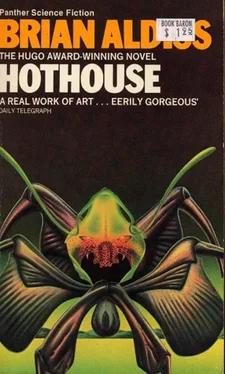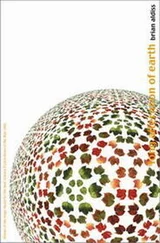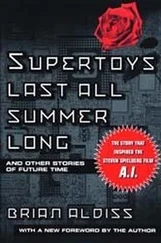Brian Aldiss - Hothouse, aka The Long Afternoon of Earth
Здесь есть возможность читать онлайн «Brian Aldiss - Hothouse, aka The Long Afternoon of Earth» весь текст электронной книги совершенно бесплатно (целиком полную версию без сокращений). В некоторых случаях можно слушать аудио, скачать через торрент в формате fb2 и присутствует краткое содержание. Жанр: Фантастика и фэнтези, на английском языке. Описание произведения, (предисловие) а так же отзывы посетителей доступны на портале библиотеки ЛибКат.
- Название:Hothouse, aka The Long Afternoon of Earth
- Автор:
- Жанр:
- Год:неизвестен
- ISBN:нет данных
- Рейтинг книги:3 / 5. Голосов: 1
-
Избранное:Добавить в избранное
- Отзывы:
-
Ваша оценка:
- 60
- 1
- 2
- 3
- 4
- 5
Hothouse, aka The Long Afternoon of Earth: краткое содержание, описание и аннотация
Предлагаем к чтению аннотацию, описание, краткое содержание или предисловие (зависит от того, что написал сам автор книги «Hothouse, aka The Long Afternoon of Earth»). Если вы не нашли необходимую информацию о книге — напишите в комментариях, мы постараемся отыскать её.
, Hugo Best Short Story Winner of 1962, we are transported millions of years from now, to the boughs of a colossal banyan tree that covers one face of the globe. The last remnants of humanity are fighting for survival, terrorised by the carnivorous plants and the grotesque insect life.
Hothouse, aka The Long Afternoon of Earth — читать онлайн бесплатно полную книгу (весь текст) целиком
Ниже представлен текст книги, разбитый по страницам. Система сохранения места последней прочитанной страницы, позволяет с удобством читать онлайн бесплатно книгу «Hothouse, aka The Long Afternoon of Earth», без необходимости каждый раз заново искать на чём Вы остановились. Поставьте закладку, и сможете в любой момент перейти на страницу, на которой закончили чтение.
Интервал:
Закладка:
Next, the morel showed, Earth's temperatures began to climb as the sun went into its destructive phase. Confident in their technology, the people prepared to meet this emergency.
'Show us no more,' Poyly whimpered, for these scenes were very bright and painful. But the morel paid her no heed and continued to force knowledge upon her.
As their preparations were being made, people began to fall sick. The sun was pouring out a new band of radiation, and gradually all mankind succumbed to the strange sickness. It affected their skin, their eyes – and their brains.
After a prolonged spell of suffering, they became immune to the radiations. They crawled forth from their beds. But something had changed. They no longer had the power to command and cogitate and fight.
They were like different creatures!
They crawled away from their great and beautiful towns, left their cities, deserted their houses – as if all that had once been home had suddenly become alien. Their social structures also collapsed, and all organization died overnight. From then on, the weeds began to flourish in the streets, and the pollen to blow over the cash registers; the advance of the jungle had begun.
The downfall of man happened not gradually but in one dreadful rush, like the collapse of a tall tower.
'It's enough,' Gren told the morel, struggling against its power. 'What is past is no concern of ours. Why should we care what happened so very long ago? You've worried us enough! Let us sleep.'
A curious sensation took him, as if his inside were being rattled while his outside remained still. The morel was metaphorically shaking him by the shoulders.
'You are so indifferent,' twanged the morel, still gripped by excitement. 'You must attend. Look! We are going back now to very distant days, when man had no history or heritage, when he was not even Man. He was then a puny thing similar to what you are now___'
And Poyly and Gren could do nothing but see the visions that followed. Though the glimpses were blurred and muddy, they watched tarsier-like people sliding down trees and running barefoot among the ferns. They were small people, nervous and without language. They squatted and pranced and hid in bushes. No detail was clear, for there had never been clear perception to record it. Scents and sounds were sharp – yet taunting as a riddle. The humans saw merely flashes of half-light, as in that primaeval world the little lives scampered and enjoyed and died.
For no reason that they recognized, nostalgia flooded them and Poyly wept.
A clearer picture came. A group of the little people paddled in marsh under giant ferns. From the ferns, things dropped and landed on their heads. The things that dropped were recognizable as morel fungi.
'In that early oligocene world, my kind was the first to develop intelligence,' twanged the morel. "There's the proof of it! In ideal conditions of gloom and moisture we first discovered the power of thought. But thought needs limbs it can direct. So we became parasitic on those small creatures, your remote ancestors!'
And it pushed Poyly and Gren forward in time again, showing them the true history of the development of man, which was also the history of the morels. For the morels, which began as parasites, developed into symbiotes.
At first they clung to the outsides of the skulls of the tarsier-people. Then as those people prospered under the connection, as they were taught to organize and hunt, they were induced, generation by slow generation, to increase their skull capacity. At last the vulnerable morels were able to move inside, to become truly a part of the people, to improve their own abilities under a curving shelter of bone...
'So the real race of men developed,' intoned the morel, throwing up a storm of pictures. "They grew and conquered the world, forgetting the origins of their success, the morel brains which lived and died with them... Without us, they would still have remained among the trees, even as your tribes live now without our aid.'
To enforce its point, it again provoked their latent memories of the time when the sun had entered its latest phase and all mankind fell sick.
'Men were physically stronger than morels. Though they survived the stepping-up of solar radiation, their symbiotic brains did not. They quietly died, boiled alive in the little bone shelters they had fashioned for themselves. Man was left... to fend for himself equipped only with his natural brains, which were no better than those of the higher animals... Small wonder he lost his splendid cities and took again to the trees!'
'It means nothing to us... nothing at all,' Gren whimpered. 'Why do you haunt us now with this ancient disaster, which all finished uncounted millions of years ago?'
The morel gave a silent noise like laughter in his head.
'Because the drama may not yet be finished! I am a sturdier strain than those of my bygone ancestors; I can tolerate high radiation. So can your kind. Now is the historic moment for us to begin another symbiosis as great and profitable as the one which once tempered those tarsiers until they rode among the stars! Again the clocks of intelligence begin to chime. The clocks have hands again...'
'Gren, he is mad and I do not understand!' Poyly cried, appalled by the turmoil behind her closed eyes.
'Hear the clocks chime!' twanged the morel. 'They chime for us, children!'
'Oh, oh! I can hear them!' Gren moaned, twisting restlessly where he lay.
And in all their ears came a sound to drown all else, a chiming sound like diabolic music.
'Gren, we are all going mad!' Poyly cried. 'The terrible noises!'
'The chimes, the chimes!' the morel twanged.
Then Poyly and Gren awoke, sitting up in a sweat with the morel afire about their heads and necks – and the terrible sound still came, more terrible still!
Through the disturbed race of their thoughts they perceived that they were now the sole occupants of the cavern under the lava bed. All the herders had gone.
The terrifying noises they could hear came from outside. Why they should be so frightening was hard to say. The main sound was almost a melody, though it gave no prospect of resolution. It sang not to the ear but to the blood, and the blood responded by alternately freezing and racing to its call.
'We must go!' Poyly said, struggling up. 'It's singing for us to go.'
'What have I done?' wailed the morel.
'What's gone wrong?' Gren asked. 'Why do we have to go?'
They clung together in fear, yet the urge in their veins would not let them remain. Their limbs moved without obedience. Whatever the dreadful tune was, it had to be followed to its source. Even the morel had no thought but to do otherwise.
Regardless of their bodies, they scrambled up the rock fall that served as stairs and into the open, to find themselves in the midst of nightmare.
Now the awful melody blew about them like a wind, though not a leaf moved. Frenziedly it plucked and tugged at their limbs. Nor were they the only creatures answering that syren call. Flying things and running things and hopping things and things that slithered battered their way through the clearing, all heading in one direction – towards the Black Mouth.
"The Black Mouth!' the morel cried. "The Black Mouth sings to us and we must go!'
It tugged not only at their ears but at their eyes. Their very retinas were partially drained of sensation, so that all the world appeared in black and white and grey. White the sky glimpsed overhead, grey the foliage that dappled it, black and grey the rocks distorted beneath their running feet. With hands extended before them, Gren and Poyly began to run amid the running things.
Now through a maelstrom of dread and compulsion they saw the herders.
Like so many shadows, the herders stood against the last trunks of the banyan. They had strapped or tied themselves there with ropes. In the centre of them, also tied, stood Iccall the Singer. Now he sang! He sang in a peculiarly uncomfortable position, as if disfigured, as if his neck were broken, with his head hanging down and his eyes wildly fixed on the ground.
Читать дальшеИнтервал:
Закладка:
Похожие книги на «Hothouse, aka The Long Afternoon of Earth»
Представляем Вашему вниманию похожие книги на «Hothouse, aka The Long Afternoon of Earth» списком для выбора. Мы отобрали схожую по названию и смыслу литературу в надежде предоставить читателям больше вариантов отыскать новые, интересные, ещё непрочитанные произведения.
Обсуждение, отзывы о книге «Hothouse, aka The Long Afternoon of Earth» и просто собственные мнения читателей. Оставьте ваши комментарии, напишите, что Вы думаете о произведении, его смысле или главных героях. Укажите что конкретно понравилось, а что нет, и почему Вы так считаете.












